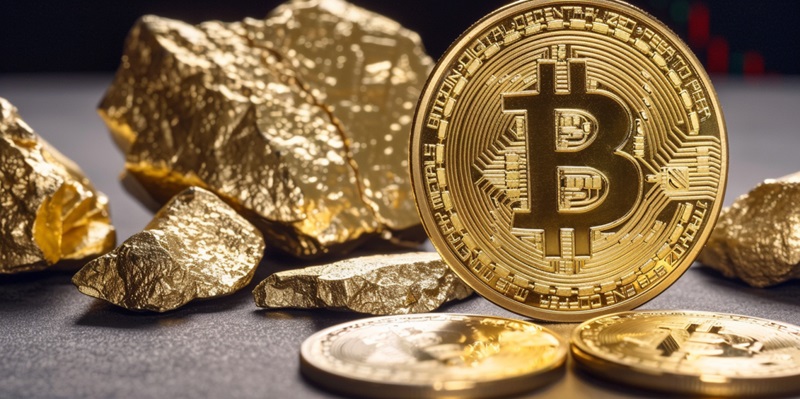The financial world watches with bated breath as China gears up to kickstart its sputtering economic engine, and Quantitative Easing (QE) seems to be its tool of choice. A strategy known for its ability to stimulate economies by flooding them with cash, QE could be a game-changer, particularly for certain assets. At the epicenter of the debate on its ripple effects sit two unconventional bedfellows: Bitcoin and Gold. These assets, traditionally sought out as hedges, could be significantly impacted by China’s monetary experiments. Let’s delve into what this means for their future.
The Mechanics of China’s Quantitative Easing
To grasp the potential effects on global markets, we must first understand how China’s QE could unfold. Under QE, China’s central bank would buy up financial assets to pump liquidity into the market, aiming to reduce the strain on borrowing. This could be particularly transformative for the real estate sector, signaling easier access to capital for companies like Evergrande that are staggering under financial duress. The broader implications for the Chinese yuan can’t be ignored, as an influx of cash may devalue the currency, potentially triggering a pivot by investors to sturdier stores of value.
The narrative of China’s real estate woes, with Evergrande at the helm, serves as a stark reminder of the fragility within China’s economic fortress. By introducing QE, the top brass aims to unchain the gargantuan sector from its financial shackles, allowing for a resurgence of activity and confidence. While it might alleviate immediate pressures, the long-term effects on the yuan’s purchasing power, and consequently on investor psyche, are yet to be fully reckoned with.
The Global Exodus to Bitcoin and Gold
The scent of freshly printed money and a weakened yuan could send investors scurrying towards assets that can better withstand inflation—enter Bitcoin and Gold. As ‘digital gold’, Bitcoin has captured the imagination of investors who see in its scarcity and decentralization attributes akin to the yellow metal. China’s QE might just be the cue for a surge in these assets, as they promise a bulwark against the tide of currency depreciation and inflation that often follows monetary easing.
For investors whose nerves are frayed by the specter of inflation, alternate assets like Bitcoin and Gold could seem like a sanctuary. These ‘safe haven’ assets have a historic allure during economic heaves and throes, and their appreciation during periods of high liquidity is well documented. However, their innate volatility juxtaposes interestingly with their potential for value preservation, painting a complex picture for the investor weighing risk against security.
Tech Stocks in the Spotlight
Tech stocks, particularly those of the Nasdaq, could also be pulled into the limelight by China’s foray into QE. An infusion of liquidity and lowered interest rates might spell a windfall for the tech sector. The sector traditionally attracts those betting on growth, especially during recovery phases, and favorable monetary conditions could enhance this appeal.
The technology sector is renowned for its resilience and adaptability, traits that investors might find even more attractive amidst the anticipated liquidity wave. With lower borrowing costs, tech companies could look forward to an easier path for raising capital, spurring innovation, and potentially leading to an influx of investments earmarked for cutting-edge ventures. How this sector juggles the boon of QE with its own inherent risks stands as a point of keen anticipation.
Risk Assets Riding the Wave
The promise and perils of China’s QE aren’t solely reserved for Bitcoin, Gold, and tech stocks. A wide array of ‘risk assets’ could benefit from this monetary largesse. As China turns bullish, it could precipitate an enhanced appetite for riskier investments, reshaping investor strategies and the broader market sentiment. This could mark an opportune moment for those who have been hovering, waiting to dive into high-growth investments that flourish in a liquidity-abundant environment.
The mirror effect on global markets as a consequence of China’s bold steps cannot be overstated. The optimistic pulse triggering through Chinese economic arteries has the potential to revive risk-taking on a global scale. As the liquidity spreads, so too might the willingness among investors to pivot towards assets that blossom with an influx of capital, presenting a dynamic investment landscape with diverse strategies vying for the limelight.
Bitcoin’s Reaction to Economic Indicators
As China prepares to jumpstart its lagging economy, the financial world watches intently, anticipating the deployment of Quantitative Easing (QE) – a technique that revives economic growth by injecting liquidity. This move is poised to potentially revolutionize the market, particularly impacting gold and Bitcoin, assets traditionally seen as safe havens.
QE, by increasing money supply, can devalue currency, leading investors to seek refuge in gold. However, the effect on Bitcoin, often dubbed ‘digital gold’, is less certain. Proponents argue it may benefit similarly to gold, as QE can fuel inflationary pressures, driving investors towards finite assets like Bitcoin.
Should China implement QE, the impact on both assets could be complex. Bitcoin might attract those looking for digital security, while gold retains its allure for traditionalists. As these two distinct assets face China’s economic strategies, their reaction could signal critical insights into the future dynamics between modern and classic stores of value.

